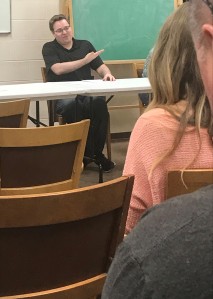This picture showed up as a Time Hop photo on Facebook recently. When I saw it, I felt joyous and sad at the same time. Joyous to be blessed with such wonderful friends, and sad to be missing the two friends in the back row with me, who went home to be with Jesus in May and July of 2017.
Phyllis (back center) and Suzanne (back right) were sisters by birth and sisters in the Lord. I know they’re with Jesus, and I rejoice with them in that. But I still miss them. Looking at this picture helps remind me that every day of life here on earth is a gift, and we should treasure our moments here with the people we love.
But this is not our permanent home. We live in a broken, sin-sick world that will never be perfect. This world includes death, disease, violence, poverty, and pain. We can’t expect it to be perfect because it isn’t our final destination. Our eternal home is with the Lord, who one day will return and create a new heaven and a new earth, and as far as His people are concerned, “He will wipe away every tear from their eyes; and there will no longer be any death; there will no longer be any mourning, or crying, or pain; the first things have passed away” (Revelation 21:4, NASB). We can count on that because the Lord has promised it, and He keeps His promises.
We are a people who can grieve with hope (1 Thessalonians 4:13)—elpis, a confident expectation; that’s what hope means in the Bible. In whom or what is our hope? “Since Jesus died and broke loose from the grave, God will most certainly bring back to life those who died in Jesus . . . We can tell you with complete confidence—we have the Master’s word on it” (1 Thessalonians 4:14-15, Msg).
Death doesn’t have the final say. Jesus does. On the cross, He said, “It is finished” (John 19:30, NASB), referring to His work to pay the penalty for and save us from our sins. Death no longer has a hold on us. We will rise from the dead as He did and spend eternity in heaven with Him. He will give us new bodies that will never die: “But when this perishable will have put on the imperishable, and this mortal will have put on immortality, then will come about the saying that is written, ‘Death is swallowed up in victory. O death, where is your victory? O death, where is your sting?’ The sting of death is sin, and the power of sin is the law; but thanks be to God, who gives us the victory through our Lord Jesus Christ” (1 Corinthians 15:54-57, NASB).
So in the midst of this broken world, where we live in bodies that will fail us one day, how then do we live?
We live as a people who realize this is not our final destination. We live as individuals whose “citizenship is in heaven” (Philippians 3:20, NASB). If we belong in heaven, then we live as folks who are heaven-minded, concerning ourselves with things that matter to the Lord, taking our directions from Him, because our allegiance is to Him. We’re instructed to “set your minds on the things above, not on the things that are on earth” (Colossians 3:2, NASB). In other words, we walk confidently through this broken world with Jesus, for Jesus, and because of Jesus.
With Jesus
The older I get, the more I realize how much I need Jesus—every moment of every day. Life is way too complicated for me to figure out. I just want to walk with Jesus. His presence gives me the strength, joy, and peace I need to keep moving forward. He promises us, “‘I am with you always, even to the end of the age’” (Matthew 28:20, NASB), and “‘I will never desert you, nor will I ever forsake you’” (Hebrews 13:5, NASB). Our lives are hidden with Christ in God (Colossians 3:3). We’re inseparable, always together, and never alone; intimacy with Jesus is the treasure we discover on our life’s journey.
“God is our refuge and strength, a very present help in trouble. Therefore we will not fear, though the earth should change and though the mountains slip into the heart of the sea” (Psalm 46:1-2, NASB). He promises His presence will go with His people, and He will give them rest (Exodus 33:14). Along the way, we discover and declare, “You will make known to me the path of life; in Your presence is fullness of joy; in Your right hand there are pleasures forever” (Psalm 16:11, NASB).
For Jesus
Another decision we can make is to walk through this broken world for Jesus, living for Him, making Him known, and seeking to cooperate with Him in fulfilling those purposes for which He created us. The scriptures tell us that each one of us is the Lord’s workmanship, specifically crafted by Him for good works that He wants us to do (Ephesians 2:10). In other words, each of us was created by Him for specific divine purposes—things He wants to accomplish for His kingdom through our lives, through the way He made each of us.
That’s why we are encouraged to pray, “Your kingdom come. Your will be done, on earth as it is in heaven” (Matthew 6:10, NASB). Jesus modeled this attitude for us when He said, “I do not seek My own will, but the will of Him who sent Me’” (John 5:30, NASB).
Two wonderful verses that emphasize this idea are: Galatians 2:20, NASB, which says, “I have been crucified with Christ; and it is no longer I who live, but Christ lives in me,” and 2 Corinthians 5:15, which adds, “and He died for all, so that they who live might no longer live for themselves, but for Him who died and rose again on their behalf.”
Because of Jesus
We also can walk through this broken world because of Jesus. He gives us the power to do it. We can do all things through Christ who strengthens us (Philippians 4:13). He has given us a spirit of power, love, and discipline (2 Timothy 1:7). “We overwhelmingly conquer through Him who loved us” (Romans 8:37, NASB).
Jesus won the battle with sin and death. The same power that raised Him from the dead is available to every one of us who believes in Him (Ephesians 1:19-20). Jesus “is able to do far more abundantly beyond all that we ask or think, according to the power that works within us” (Ephesians 3:20, NASB).
Jesus has been given all authority (Ephesians 1:21-22), and we are seated with Him in that place of authority (Ephesians 1:20, 2:6). We have been given a position of victory; we just need to stand firm and hold our position in Christ (Ephesians 6:10-11). The battle has already been won. Jesus empowers us to live in His victory.
When we live in this broken world with Jesus, for Jesus, and because of Jesus, something incredible happens. We do things that matter. We live for what lasts. We “seek first His kingdom and His righteousness” (Matthew 6:33, NASB), and we store up treasures in heaven (Matthew 6:20), the place of our eternal home.
I know my friends Phyllis and Suzanne have passed from death into life (John 5:24). They have entered into the joy of their Master (Matthew 25:21, 23), and their faith has become sight (2 Corinthians 5:7). May we live as Jesus’ faithful servants until we experience the same.
Question: How would you like to experience more of the presence, purpose, or power of Jesus in your life? Comment at the link below.
Revelation 21:4; 1 Thessalonians 4:13-15; John 19:30; 1 Corinthians 15:54-57; Philippians 3:20; Colossians 3:2-3; Matthew 28:20; Hebrews 13:5; Psalm 46:1-2; Exodus 33:14; Psalm 16:11; Ephesians 2:10; Matthew 6:10; John 5:30; Galatians 2:20; 2 Corinthians 5:15; Philippians 4:13; 2 Timothy 1:7; Romans 8:37; Ephesians 1:19-22; 3:20; 2:6; 6:10-11; Matthew 6:33, 20; 25:21, 23; John 5:24; 2 Corinthians 5:7



















